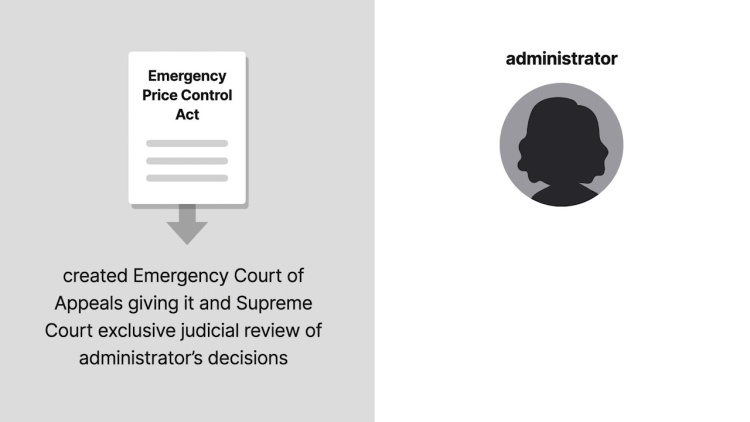Yakus v. United States
United States Supreme Court
321 U.S. 414 (1944)

- Written by Sean Carroll, JD
Facts
Pursuant to the Emergency Price Control Act (the act), the Office of Price Administration, headed by the price administrator (administrator), established maximum prices for several commodities, including beef. The act’s stated purpose was to stabilize prices to avoid wartime inflation. Further, the act provided that the administrator, an executive officer, would fix the maximum price of a commodity only if the price first rose to a level inconsistent with the act’s purpose. Finally, the act established standards that the administrator was to apply in fixing prices. For example, fixed prices were to be fair and equitable, and the administrator was required to consider prevailing prices during the period prior to the increase prompting regulation. The act also delineated the procedure by which a person could challenge a fixed price’s validity. A person could file a petition with the administrator within 60 days of a regulation being issued. Further, the act created the Emergency Court of Appeals and granted that court and the United States Supreme Court exclusive jurisdiction to review the administrator’s decisions. Albert Yakus (defendant) was charged with selling beef at prices above the maximum prescribed by the administrator. In his defense, Yakus argued that the act constituted an improper delegation of legislative power. He also argued that the fixed price was unfair and therefore invalid. However, Yakus had not previously challenged the price’s validity by filing for review with the administrator, and the 60-day period to do so had passed. Yakus was convicted, and the First Circuit affirmed. The Supreme Court granted certiorari.
Rule of Law
Issue
Holding and Reasoning (Stone, C.J.)
Dissent (Roberts, J.)
What to do next…
Here's why 904,000 law students have relied on our case briefs:
- Written by law professors and practitioners, not other law students. 47,100 briefs, keyed to 995 casebooks. Top-notch customer support.
- The right amount of information, includes the facts, issues, rule of law, holding and reasoning, and any concurrences and dissents.
- Access in your classes, works on your mobile and tablet. Massive library of related video lessons and high quality multiple-choice questions.
- Easy to use, uniform format for every case brief. Written in plain English, not in legalese. Our briefs summarize and simplify; they don’t just repeat the court’s language.





